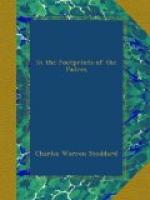The moon shone, but paler now for it was growing late, on a closed coupe that rolled rapidly from the Club House in the early morning after a High Jinks night, and clattered through the streets accompanied by the matutinal milk wagons with their frequent, intermittent pauses; thus it rolled and rolled over the resounding pavement toward that house on the hill top, The Eyrie.
The vehicle zigzagged up the steep grade, and stopped at the foot of the long stairway; some one alighted and exchanged a friendly word or two with the driver, for in that lonely part of the town it was pleasant to hear the sound of one’s own voice even if one was guiltily conscious of making conversation; then with a cheerful “Good-night,” this some-one climbed the steps while the vehicle hurried away with its jumble of hoofs and wheels. A key was heard at the outer door; the door sagged a little in common with everything about the house—and a tenant passed into the Eyrie.
Enter Paul Clitheroe, sole scion of that melancholy house whose foundations had sunk under him, and left him, at the age of five and twenty, master of himself, but slave to fortune.
In the dim light he closed and fastened the outer door; from a hall scarcely large enough for two people to pass in, he entered the inner room with the confident step of a familiar. Having deposited hat, cane and ulster in their respective places—there was a place for everything or it would have been quite impossible to abide in that snuggery—he sank into one of the easy chairs, rolled a cigarette with meditative deliberation, lighted it and blew the smoke into the moonlight where it assumed a thousand fantastic forms.
The silence of the room seemed emphasized by the presence of its occupant; he was one who under no circumstances was likely to disturb the serenity of a house. In most cases a single room takes on the character of the one who inhabits it; this is invariably the case where the apartment is in the possession of a woman; but turn a man loose in a room, and leave him to himself for a season, and he will have made of that room a witness strong enough to condemn or condone him on the Last Day; the whole character of the place will gradually change until it has become an index to the man’s nature; where this is not the case, the man is without noticeable characteristics.
Those who knew Paul Clitheroe, the solitary at the Eyrie, would at once recognize this room as his abode; those of his friends who saw this room for the first time, without knowing it to be his home, would say: “Paul Clitheroe would fit in here.” A kind of harmonious incongruity was the chief characteristic of the man and his solitary lodging.
He sat for some time as silent as the inanimate objects in that singularly silent room. An occasional turn of the wrist, the momentary flash of the ash at the end of his cigarette, the smoke-wreath floating in space—those were all that gave assurance of life; for when this solitary returned into his well-chosen solitude he seemed to shed all that was of the earth earthy, and to become a kind of spectre in a dream.




